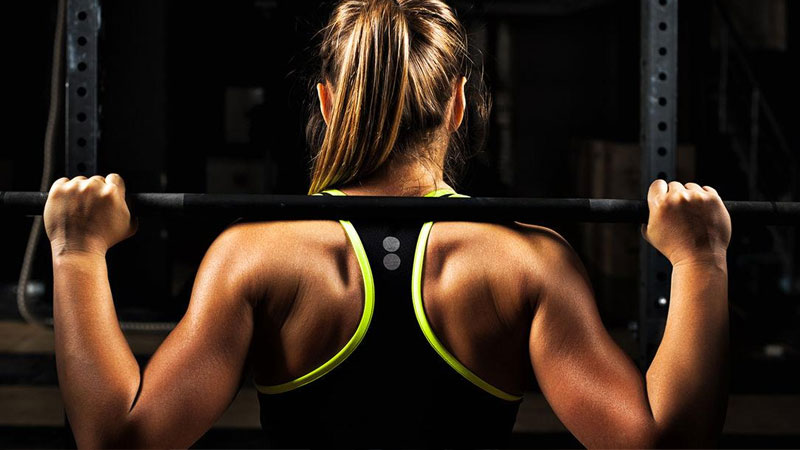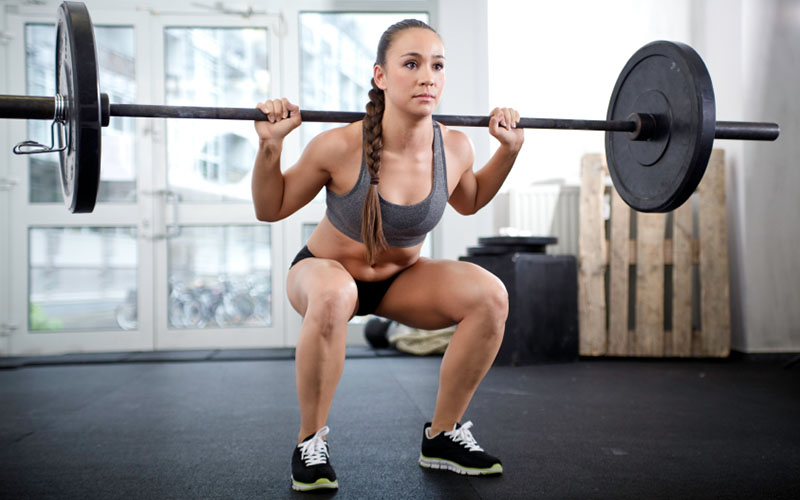
How Much Weight Should a Woman Be Able to Lift?
More and more women are hitting the weights room in a quest to build shape, tone and curves. But how much weight should you actually be able to lift?
Gone are the days when women focused on cardio to develop athletic, sexy figure they deserved. It wasn’t efficient and many women struggled to achieve the figure they were after.
Now it’s all about lifting heavy weights. And pressing, squatting and pulling your way to your best body ever.
Strength training on a regular basis has numerous benefits for your body and your mind. But have you ever wondered if you’re actually lifting heavy enough to reach your goals?
Or how your numbers compare to other women?
Here’s our guide to how much weight you should be able to lift as as woman…
Women and Weightlifting – The Revolution
Back in the day, the only women who chose to lift weights were hardcore bodybuilders. They didn’t mind mixing it with the guys. Over time, we’ve become less intimidated and that’s led to women practically taking over.
Now we’re absolutely smashing it. And with strength training being an effective cure for flabby abs, weak muscles and low confidence, we’ve never felt so good in the gym.
According to statistics, there are still less than 25% of women lifting weights the minimum twice per week.
But that number is going up year upon year.
There’s a revolution coming.
And as women, it’s us that are at the forefront of it.
Not every woman knows if what they’re doing is right. You might be a complete noob when it comes to strength training, or you might be experienced, but still unsure.
Being new to the gym can leave you feeling flustered and unsure where to start. And with so much equipment and weights to choose from, you might still be uncertain if you’re making the right choices.
You don’t want to go too heavy and cause yourself an injury. But on the other hand you know that going too light won’t help you craft the figure you’re dreaming of.
Power your workout sessions with the right pre-workout:
Rule number one: form before load, technique before ego
When it comes to optimizing results from strength training, one thing’s for sure; never sacrifice good technique.
Ensuring proper form above all else means you’re more likely to hit your targets. You’ll reduce unnecessary soreness and niggles that undermine your fitness goals.
Here’s your checklist for keeping your form strict and safe:
- Don’t use momentum or ‘cheat’ the weight
- Keep your movements controlled and under tension
- Avoid muscle failure and don’t train past the point of fatigue
- Get a spotter on lifts where you need one
- If it hurts, stop right away
- Choose weights that are appropriate for your abilities
How to choose the right weights
Whether it’s “how much weight should I lift for my size”, or “how much weight should I lift to gain muscle”, the answer is that it depends.
When it comes to strength training for fat loss and building toned muscle, it’s all about the weight you lift.
You don’t want to go too heavy as you’ll not reach your desired rep range, you could get injured and you’ll more than likely lose form.
But go too light and you’ll not achieve progressive overload or create the microscopic damage needed to force your muscles to adapt and gain shape.
The weight you should be able to lift is one that allows you to only just complete your designated number of reps.
For example, if your rep range is 8-12, the weight you choose should allow you to perform more than 7 reps, but less than 13. If you can blast out more than 12 reps easily, it’s not heavy enough.
You should be just about able to squeeze that last rep out.
At a push.
Over time your body will adapt and you’ll get stronger. The minute you can lift that weight easily, you’ve got to increase it to keep pushing your fitness levels.

So How Much Weight Should a Woman Be Able to Lift?
Every woman is different. It’s what makes us the beautiful individuals that we are.
One woman might be able to squat with 50 lb easily. Whereas for another it might be far too much.
Finding the correct loads takes patience and practice.
Keeping a log of your weights is useful as it helps you know exactly what you should be lifting.
Here’s how much you should be able to lift…
If you’re female, healthy and over 18 years old (because the available data only includes women aged 18 or over), here’s how much weight you should be able to lift…
These are 1-repetition maximum (1RM) scores. This means you should be able to lift these weights for 1 full rep.
The only limitation is that these charts are restricted to the ‘big 3’ lifts – bench press, squat and deadlift. Presumably because there’s no data available on other lifts.
All of the weights in the table are in lbs.
Bench press
| Body Weight | Novice | Intermediate | Advanced |
|---|---|---|---|
| 105 | 70 | 80 | 100 |
| 123 | 80 | 90 | 115 |
| 148 | 90 | 105 | 135 |
| 181 | 110 | 120 | 160 |
| 198 | 115 | 130 | 165 |
Back squat
| Body Weight | Novice | Intermediate | Advanced |
|---|---|---|---|
| 105 | 90 | 105 | 140 |
| 123 | 105 | 120 | 160 |
| 148 | 120 | 140 | 185 |
| 181 | 140 | 165 | 215 |
| 198 | 150 | 175 | 230 |
Deadlift
| Body Weight | Novice | Intermediate | Advanced |
|---|---|---|---|
| 105 | 115 | 130 | 190 |
| 123 | 130 | 150 | 210 |
| 148 | 150 | 175 | 240 |
| 181 | 175 | 205 | 275 |
| 198 | 185 | 215 | 285 |
Women hold around 60% of their total muscle mass in their lower bodies (men only have 50%). If you notice, you should be able to lift much heavier weights for the squat and deadlift compared to the bench press.
Remember though, these are only guidelines.
How much weight a woman should be able to lift depends on experience, body weight, muscle mass and strength.
If you need an extra energy boost, try a pre-workout.
Will Lifting Heavy Weights Lead to Bulky Muscles?
One concern that many women have is that lifting heavier weights might lead to huge muscles and a loss of femininity.
That couldn’t be further from the truth though.
Regular weight training and a controlled diet lead to better fitness levels, lower body fat, toned muscles and a sexy, feminine shape.
The benefits include:
- More confidence and better mood
- Enhanced energy
- Lower risk of obesity, osteoporosis and sarcopenia
- Burns more calories
- Gain strength without muscle bulk
- Better menstrual cycles
The reason why weight training won’t lead to big, bulky muscles is that you don’t have testosterone levels as high as the guys do.
In fact, with 15-70 ng.dL of the natural hormone in your blood, that’s almost 15 times lower than the 300-1,000 ng.dL the average man will have.
And while testosterone is important for women, you just don’t have enough of the androgen floating around your body to cause any masculinity whatsoever.





